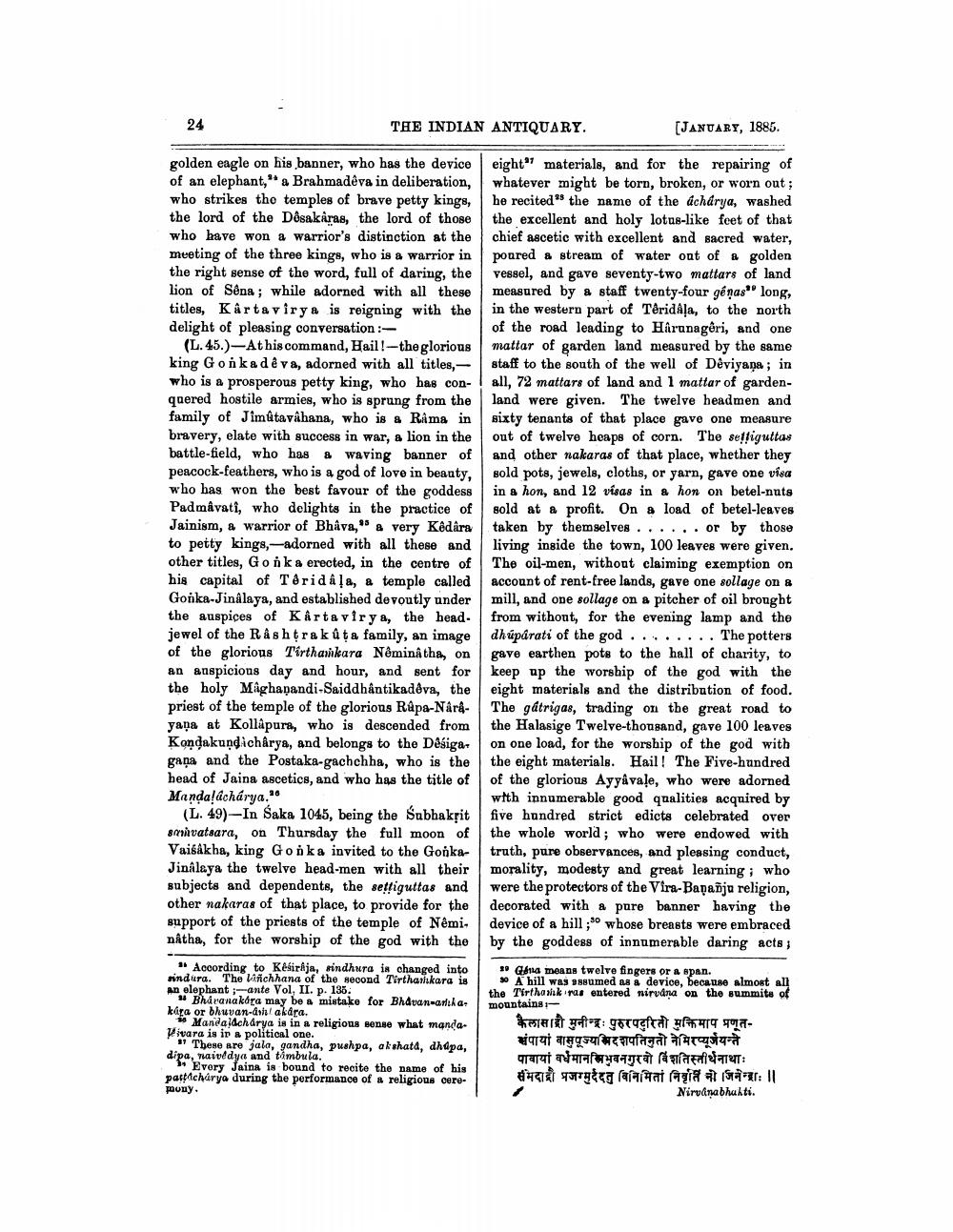________________
24
THE INDIAN ANTIQUARY.
golden eagle on his banner, who has the device of an elephant," a Brahmadêva in deliberation, who strikes the temples of brave petty kings, the lord of the Dêsakaras, the lord of those who have won a warrior's distinction at the meeting of the three kings, who is a warrior in the right sense of the word, full of daring, the lion of Sêna; while adorned with all these titles, Kartavirya is reigning with the delight of pleasing conversation:
(L.45.)-At his command, Hail!-the glorious king Gonka dêva, adorned with all titles, who is a prosperous petty king, who has conquered hostile armies, who is sprung from the family of Jimatavahana, who is a Rama in bravery, elate with success in war, a lion in the battle-field, who has a waving banner of peacock-feathers, who is a god of love in beauty, who has won the best favour of the goddess Padmavati, who delights in the practice of Jainism, a warrior of Bhâva," a very Kêdâra to petty kings,-adorned with all these and other titles, Gonka erected, in the centre of his capital of Têridaļa, a temple called Gonka-Jinâlaya, and established devoutly under the auspices of Kartavirya, the headjewel of the Rashtrakuta family, an image of the glorious Tirthankara Nêminâtha, on an auspicious day and hour, and sent for the holy Maghapandi-Saiddhantikadêva, the priest of the temple of the glorious Râpa-Nârâyana at Kollapura, who is descended from Kondakundacharya, and belongs to the Dêsigagana and the Postaka-gachchha, who is the head of Jaina ascetics, and who has the title of Mandaláchárya.
(L. 49)-In Saka 1045, being the Subhakrit samvatsara, on Thursday the full moon of Vaisakha, king Gonka invited to the GonkaJinâlaya the twelve head-men with all their subjects and dependents, the seṭṭiguttas and other nakaras of that place, to provide for the support of the priests of the temple of Nêminatha, for the worship of the god with the
According to Késirkja, sindhura is changed into sindura. The Liñchhana of the second Tirthankara is an elephant-ante Vol, II. p. 135.
Bharanakóra may be a mistake for Bhavan-anika. kára or bhuvan-ah akára.
Mandalacharya is in a religious sense what manda Vivara is in a political one.
7 These are jala, gandha, pushpa, akshata, dhupa, dipa, naivedya and timbula.
Evory Jaina is bound to recite the name of his pattacharya during the performance of a religious cere
mony.
[JANUARY, 1885.
eight materials, and for the repairing of whatever might be torn, broken, or worn out; he recited the name of the acharya, washed the excellent and holy lotus-like feet of that chief ascetic with excellent and sacred water, poured a stream of water out of a golden vessel, and gave seventy-two mattars of land measured by a staff twenty-four genas" long, in the western part of Têridaļa, to the north of the road leading to Harunagêri, and one mattar of garden land measured by the same staff to the south of the well of Dêviyana; in all, 72 mattars of land and 1 mattar of gardenland were given. The twelve headmen and sixty tenants of that place gave one measure out of twelve heaps of corn. The seṭṭiguttas and other nakaras of that place, whether they sold pots, jewels, cloths, or yarn, gave one visa in a hon, and 12 visas in a hon on betel-nuts sold at a profit. On a load of betel-leaves taken by themselves.. .. or by those living inside the town, 100 leaves were given. The oil-men, without claiming exemption on account of rent-free lands, gave one sollage on a mill, and one sollage on a pitcher of oil brought from without, for the evening lamp and the dhuparati of the god... ... The potters gave earthen pots to the hall of charity, to keep up the worship of the god with the eight materials and the distribution of food. The gátrigas, trading on the great road to the Halasige Twelve-thousand, gave 100 leaves on one load, for the worship of the god with the eight materials. Hail! The Five-hundred of the glorious Ayyâvale, who were adorned with innumerable good qualities acquired by five hundred strict edicts celebrated over the whole world; who were endowed with truth, pure observances, and pleasing conduct, morality, modesty and great learning; who were the protectors of the Vira-Baṇañju religion, decorated with a pure banner having the device of a hill; whose breasts were embraced by the goddess of innumerable daring acts;
29 Géna means twelve fingers or a span.
30 A hill was assumed as a device, because almost all the Tirthak ras entered nirvana on the summits of mountains:
कैलासाद्री मुनीन्द्रः पुरुरपदुरिती मुक्तिमाप प्रणूत
पायां वासुपूज्यस्त्रिदशपतिमुतो नेभिरप्यूर्जयन्ते पावायां वर्धमान त्रिभुवनगुरवो विंशतिस्तीर्थनाथाः मेदाद्रौ प्रजग्मुर्ददतु विनिमित्तां निवृति नो जिनेन्द्राः ॥ Nirvanabhakti.




